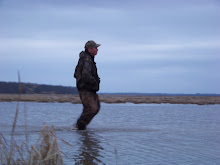"Stage Fright"
Stage fright is the stifling sensation of apprehension and self-consciousness that washes over someone appearing before a large group of people or performing some act on his own in front of others. High school debate team members may feel it before clashing over politically important issues. Musicians may feel it when performing a solo in a packed concert hall or on the 50-yard line during halftime. Salesmen may suffer from it during a sit. Actors can be crippled by it onstage.
Indisputably, the outdoors is a place folks go to relax, get away from it all and put the troubles of every day life behind them, if just for a couple of days or so. But even out here under the pines and the hardwoods, on the lake, and among the woods and the wildlife, stage fright can affect us, too.
I don’t know about your friends and hunting buddies, but the guys I hunt with can be downright merciless when it comes to dishing out grief and trash talk. As one of my hunting buddies recently understated their propensity in this regard, “Rog, we can be pretty irreverent some times.” We pick on each other under the best of conditions, and really savor those moments when someone misses, falls down in the muck or gets his truck stuck.
You really have to be on your guard to avoid getting picked on and run through the ringer in most hunting camps. Yet, inevitably, we all face those situations when we’re ushered out onstage and thrust into the spotlight, whether we’re ready for it or not.
Take turkey hunting, for example. Anyone new to turkey hunting goes through a prolonged period of doubt and apprehension about the quality of his turkey calling. Anyone who says otherwise has either just overdosed on Beta blockers or is a complete liar. When the novice is alone in the woods, his only critic is the turkey itself. Certainly, the goal is to get the turkey to gobble back at your calling, but if your calling stinks when you’re by yourself, the damage to your ego is manageable. After all, if a tree falls in the woods and no one’s around to hear it, who cares whether a turkey gobbled back or not?
Now, take the novice turkey caller and sit him down fifteen yards from a very experienced hunting buddy whose calls sound better than the hens themselves. Chances are, he won’t do too much calling on his own, out of fear that he won’t sound good, or that he’ll screw up the hunt. Asking for advice back at the camphouse and getting an impromptu calling lesson is one thing; retching out an imperceptible squawk that sounds like a diving pterodactyl and runs off a gobbler that was moments away from stepping into gun range is quite another. No one wants to be singularly responsible for ruining a hunt. That’s stage fright.
It can happen anywhere in the woods or on the water. When you set the hook on that lunker bass, all eyes are on you as you land that fish and get it in the boat. No pressure.
Walking up behind a pair of bird dogs on a perfect point. You know, the kind of point that’s worthy of being the subject of an oil painting hanging from a stone fire place in a south Georgia plantation. The point is perfect, the weather’s perfect, the day is perfect. Unless you miss when the birds flush. The look of disappointment and judgment in the dogs’ eyes is far worse than anything you’ll suffer from your friends. You’re on stage and it’s all up to you.
I’ve felt that sense of stage fright in all of those situations. I really feel it when I’m cleaning a deer and all my buddies are standing around watching. But I remind myself that everybody misses on easy singles going away from us from time to time; we all leave some choice tenderloin on the bone; most of our friends can clean a deer faster than we can; and everybody thinks his purring and clucking is better than the next guy’s. So on those rare times when we do come through in the clutch and call up that gobbler or bring down that crossing double, it feels that much better to have overcome our own personal sense of stage fright.
(c) Roger Guilian 2011

